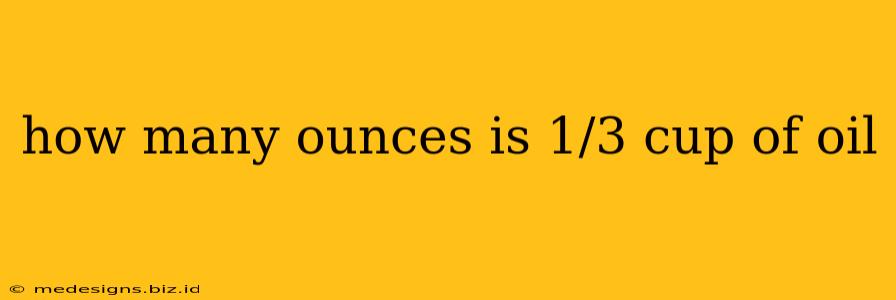How Many Ounces is 1/3 Cup of Oil? A Quick Conversion Guide
Knowing how to convert measurements in cooking is crucial for achieving the perfect recipe. One common question arises when dealing with liquid ingredients: how many ounces are in 1/3 cup of oil? This simple guide will clarify the conversion and offer helpful tips for future measurements.
Understanding the Conversion: Cups to Ounces
The conversion from cups to ounces isn't always straightforward because it depends on what you're measuring. However, for liquids like oil, we generally use the following:
- 1 cup = 8 fluid ounces
Therefore, to find out how many ounces are in 1/3 cup of oil, we simply perform the following calculation:
(1/3 cup) * (8 fluid ounces/cup) = 2.67 fluid ounces
So, 1/3 cup of oil is approximately 2.67 fluid ounces. You might round this down to 2 ⅔ fluid ounces for practical purposes in the kitchen.
Tips for Accurate Measurement
While the above calculation gives a precise answer, it's helpful to know some practical tips for measuring oil accurately:
- Use a liquid measuring cup: These are designed specifically for measuring liquids and provide a more accurate reading than dry measuring cups.
- Check your measuring cup: Make sure your measuring cup is calibrated correctly and is clean. Residue on the cup can affect measurements.
- Pour slowly: Avoid pouring oil too quickly into the measuring cup to prevent spills and ensure accurate measurement.
- Read at eye level: When checking your measurements, hold the measuring cup at eye level to get a precise reading. The meniscus (the curve of the liquid) should be aligned with the measurement line.
- Consider a kitchen scale: For more precise measurements, a kitchen scale can accurately weigh the oil, eliminating potential inaccuracies in volume conversions. You can look up the weight of a fluid ounce of your specific type of oil (e.g., olive oil, canola oil) and weigh out the appropriate amount.
Beyond the Conversion: Why Accurate Measurement Matters
Accurate measurement is important in cooking because it directly impacts the final product. Too much or too little oil can significantly affect the taste, texture, and overall success of your recipe. Whether you're baking a cake, sautéing vegetables, or making a salad dressing, paying attention to detail in your measurements will help you create delicious and consistent results. Mastering this basic conversion is one small step toward becoming a more confident and proficient cook!
